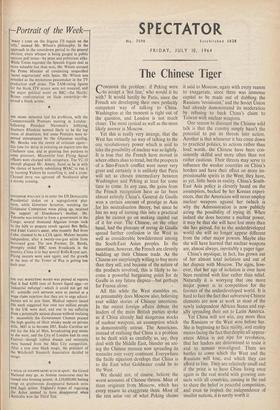The Chinese Tiger
CONSIDER the problem : if Peking were to accept a 'hot line,' who would it be with? It would hardly be Paris, since the French are developing their own perfectly competent way of talking to China. Washington at the moment is right out of the question, and London is not much closer. The most cynical as well as the most likely answer is Moscow.
Yet this is really very strange, that the West has virtually no way of talking to the one revolutionary power which is said to . take the possibility of nuclear war so lightly. It is true that the French have moved in where others shun to tread, but the prospects of a Sino-French conflict were never very great and certainly it is unlikely that Paris will act as chosen intermediary between • Washington and Peking at least for some time to come. In any case, the gains from the French recognition have so far been almost entirely China's. General de Gaulle won a certain amount of prestige in Asia for his neutralisation theory, but since he has no. way of turning this into a practical plan he cannot go on making capital out of it for ever. The Chinese, on the other - hand, had the pleasure of seeing de Gaulle spread further confusion in the West as well as considerable bewilderment among the South-East Asian peoples. In the meantime, however, the French are cleverly building up their Chinese trade. As the Chinese are surprisingly willing to buy more than they sell, and because of the nature of .the products involved, this is likely to be- come a powerful bargaining point for de Gaulle in any future dispute—but perhaps for France alone.
All this while the West stumbles on, as presumably does Moscow also, believing ever wilder stories of Chinese intentions. In the recent foreign affairs debate the leaders of the main British parties spoke as if China already had dangerous stocks of nuclear weapons, an assumption which is demonstrably untrue. The Americans, instead of realising that China is a problem to be dealt with as carefully as, say, they deal with the Middle East, blunder on see- ing the Chinese menace now spreading its tentacles over every continent. Everywhere the facile equation develops that China is to the East what Goldwater could be to the West.
We should not, of course, believe the worst accounts of Chinese threats. Most of them originate from Moscow, which has every reason to exaggerate them. Most of the rest arise out of what Peking claims it said to Moscow, again with every reason to exaggerate, since there was immense capital to be made out of dubbing the Russians 'revisionist,' and the Soviet Union had already demonstrated its moderation by refusing to back China's claim to Taiwan with nuclear weapons. One reason to discount the Chinese wild talk is that the country simply hasn't the potential to put its threats into action. Another is that whenever it has come down to practical politics, to actions rather than loud words, the Chinese have been con- sistently skilful and more often than not rather cautious. Their threats may serve to influence the weaker countries on China's borders and have their effect on more im- pressionable spirits in the West; they have, as yet, little basis in reality. China's South- East Asia policy is cleverly based on the assumption, backed by her Korean experi- ences, that the Americans will never employ nuclear weapons against her (which is why the Administration is now publicly airing the possibility of trying it). When indeed she does become a nuclear power, it may be that she will have lost more than she has gained, for to the underdeveloped world she will no longer appear different from the other major powers. Maybe also she will have learned that nuclear weapons are, almost always, inevitably a paper tiger.
China's mystique, in fact, has grown out of her almost total isolation and out of her dispute with Moscow. The signs, how- ever, that her age of isolation is over have been received with fear rather than relief. Naturally it is worrying that one more major power is in competition for the favours of the underdeveloped world. It is hard to face the fact that subversive Chinese elements are now at work in most of the newly independent African States and rap- idly spreading their net to Latin America. Yet China will not win, any more than the Russians or the West won before her. She is beginning to face reality, and reality means facing the fact that despite all appear- ances Africa is not ripe for revolution, that her leaders are determined to resist it and to remain non-aligned. There are battles to come which the West and the Russians will lose, and which they can afford to lose. They are relatively small and if the price is to have China living once again in the real world with growing con- tacts with all countries, coming in the end to share the belief in peaceful competition, and even to respect the independence of smaller nations, it is surely worth it.










































 Previous page
Previous page